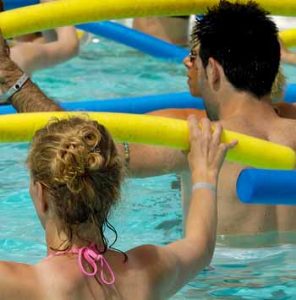
More evidence that low-calorie sweeteners are bad for your health
Studies show that artificial sweeteners can raise the risk of hypertension, metabolic syndrome, type 2 diabetes and heart disease, including stroke.

Natural Health News — Exercise can have a positive influence on certain symptoms of multiple sclerosis.
A joint study of researchers from Iran and from University of Basel has shown that patients who do yoga and aquatic exercise suffer less from fatigue, depression and other physical symptoms.
Multiple sclerosis (MS) is a chronic progressive auto-immune disease in which the body’s own immune system attacks the nerve tissue, potentially resulting in movement disorders. Other typical symptoms of MS include physical and mental fatigue as well as faintness, depression and paresthesia such as pins and needles, itchiness and numbness.
» Multiple sclerosis (MS) is a chronic progressive auto-immune disease in which the body’s own immune system attacks the nerve tissue. It produces both physical and mental/emotional ones.
» There is growing evidence that exercise programs have a positive influence on fatigue and psychological symptoms such as depression
» In this small trial, an 8 week program of yoga and aquatic exercise improved feelings of fatigue and depression as well as a range of physical symptoms in women suffering from MS.
Yoga uses a combination of body postures and breathing exercises to strengthen the relationship between the mind and body. It is a gentle form of exercise that is suitable for all, regardless of age, sex or ability.
Aquatic exercise is a low-impact activity that takes the pressure off your bones, joints and muscles. Water offers natural resistance, which can help strengthen muscles.
Increased risk of depression without exercise
In the current study 54 women with MS and an average age of 34 were assigned to one of three groups: yoga, aquatic exercise or no exercise. Before and after the trial, patients were asked to complete a questionnaire about their symptoms. All patients continued with their existing treatment, including any medication taken to regulate the immune system.
Results showed that these symptoms significantly improved after an 8 week program of yoga or aquatic exercise, three times per week. In comparison to the control group, fatigue, depression and paresthesia were significantly reduced in patients who took part in the exercise programmes. In the non-exercising group, the likelihood of moderate to severe depression was 35-fold higher than in the groups who had done yoga or aquatic exercise.
“Exercise training programs should be considered in the future as possible complements to standard MS treatments,” write the researchers.
The study was published in the journal Medicine & Science in Sports & Exercise.

Please subscribe me to your newsletter mailing list. I have read the
privacy statement